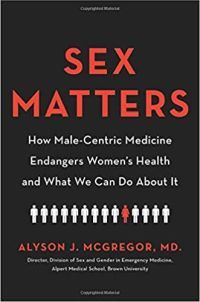I picked up The Lady’s Handbook for Her Mysterious Illness because, well, I’d grown up with a very mild but mysterious illness of my own.
After being hospitalized as a child for an unknown virus, I spent years complaining about mild joint pain and persistent fatigue. My mom thought I was just lazy (thanks, Mom). I was eventually diagnosed with and treated for Lyme disease, but the symptoms persisted. Later on, in my late teens, I was again hospitalized for an unknown virus. The only explanation I was given was that it was maybe possibly chronic fatigue syndrome. Many of you know that this is a diagnosis that’s often offered up when a doctor has decided to just throw their hands up in surrender.
So although author Sarah Ramey’s health struggles are far more severe than my own, her story still felt familiar. Those years of not being believed, not being taken seriously, having my complaints minimized. The ever-growing list of seemingly unrelated, unexplainable symptoms (in my case everything from painful periods to painful sex). I found myself engrossed by her story of how, over the course of decades, she researched her symptoms, connecting the dots in all sorts of fascinating ways.
But what Ramey’s book doesn’t acknowledge is that women aren’t the only people who are underserved by our healthcare system. Here’s a short reading list to get you acquainted with how inequities within the healthcare system affect various marginalized populations.
Black Man in a White Coat by Damon Tweedy, MD
In this memoir, Tweedy shares the story of how he entered the medical field completely unaware of how much race would come to influence his encounters with patients. Over the course of medical school, and well into his time as a practicing physician, he comes to learn more about the root causes of many of the health problems that seemed to disproportionately affect those in the Black community. These discoveries are shadowed further by his own experiences after being diagnosed with a chronic disease.
Just Medicine by Dayna Bowen Matthew
Coming at the issue from a different angle, Matthew, a professor of law, believes we’re going about things all wrong. She acknowledges that better, more culturally competent medical training and increased access to healthcare can help in reducing healthcare disparities. But at their heart, she writes, these disparities persist because of unconscious racial and ethnic bias. In this weighty read, she delves into implicit bias and lays out possible legal solutions.
 Bodies and Barriers Edited by Adrian Shanker
Bodies and Barriers Edited by Adrian Shanker
In this fairly new resource (this book just came out in March 2020), 26 queer activists write about the healthcare challenges those within the queer community face over the course of their lives. In gathering these voices together, it is Shanker’s intention that medical professionals, policymakers, and activists will walk away with a road map they can use to make clinical, behavioral, and policy changes, eventually eradicating these health disparities.
Doing Harm by Maya Dusenbery
Coming back to the ladies, this book from 2018 came at a time when women were just starting to learn more about the ways in which male-centered health research left medical practitioners ill-equipped to adequately treat women. In it, Dusenbery delves into these research deficits, placing them alongside a history in which women are mistrusted and misdiagnosed. From there, she shows us how these early storylines about women have reverberated into the healthcare field today.
 Sex Matters by Alyson J. McGregor, MD
Sex Matters by Alyson J. McGregor, MD
And McGregor carries on where Dusenbery leaves off, getting into the specifics of how various illnesses present differently in women and men. But she doesn’t stop there. After giving the lowdown on how we might recognize the symptoms for heart attacks, strokes, and more—and on how medications affect women differently—McGregor gives women actionable steps they can take to ensure that they receive the healthcare they deserve.












